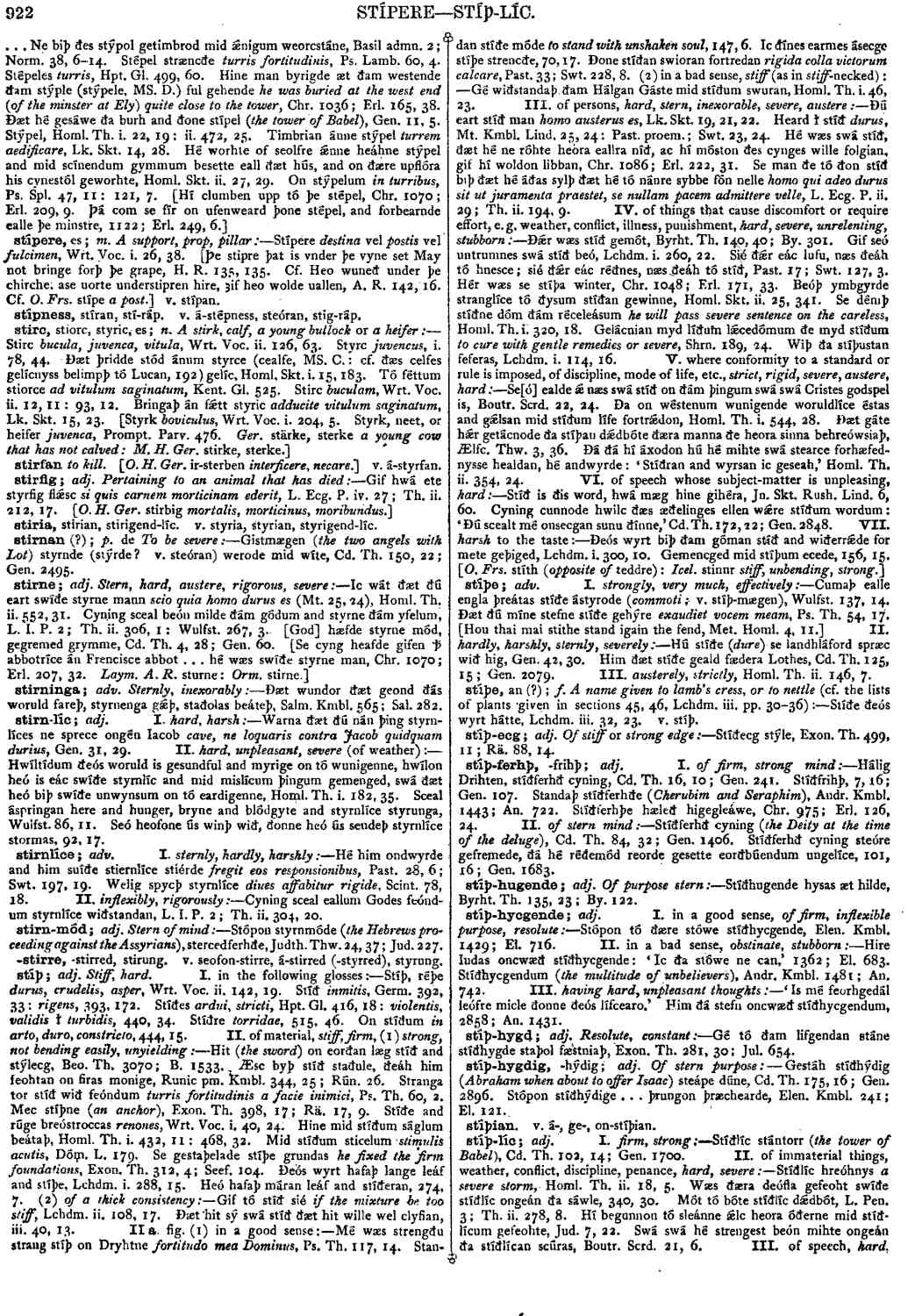stíþ
- adjective
-
Stíþ, réþe
durus, crudelis, asper,
- Wrt. Voc. ii. 142, 19.
-
Stíð inmitis, Germ. 392, 33 :
rigens,
- 393, 172.
-
Stíðes ardui, stricti, Hpt. Gl. 416, 18 :
violentis, validis ł turbidis,
- 440, 34.
-
Stiðre
torridae,
- 515, 46.
-
On stíðum
in arto, duro, constricto,
- 444, 15.
-
Hit (
the sword
) on eorðan læg stíð and stýlecg,- Beo. Th. 3070 ; B. 1533. ,
-
Stranga tor stíð wið feóndum
turris fortitudinis a facie inimici,
- Ps. Th. 60, 2.
-
Mec stíþne (
an anchor
),- Exon. Th. 398, 17 ; Rä. 17, 9.
-
Stíðe and rúge breóstroccas
renones,
- Wrt. Voc. i. 40, 24.
-
Hine mid stíðum ságlum beátaþ,
- Homl. Th. i. 432, 11 : 468, 32.
-
Mid stíðum sticelum
stimulis acutis,
- Dóm. L. 179.
-
Se gestaþelade stíþe grundas
he fixed the firm foundations,
- Exon. Th. 312, 4 ; Seef. 104.
-
Ðeós wyrt hafaþ lange leáf and stíþe,
- Lchdm. i. 288, 15.
-
Heó hafaþ máran leáf and stíðeran,
- 274, 7.
-
Gif tó stíð sié
if the mixture be too stiff,
- Lchdm. ii. 108, 17.
- Ðæt hit sý swá stíð ðæt hit wille wel clyfian, iii. 40, 13. IIa. fig.
-
Mé wæs strengðu strang stíþ on Dryhtne
fortitudo mea Dominus,
- Ps. Th. 117, 14.
-
Stan*-*dan stíðe móde
to stand with unshaken soul,
- 147, 6.
-
Ic ðínes earmes ásecge stíþe strencðe,
- 70, 17.
-
Ðone stíðan swioran fortredan
rigida colla victorum calcare,
- Past. 33 ; Swt. 228, 8.
-
Gé wiðstandaþ ðam Hálgan Gáste mid stíðum swuran,
- Homl. Th. i. 46, 23.
-
Ðú eart stíð man
homo austerus es,
- Lk. Skt. 19, 21, 22.
-
Heard ł stíð
durus,
- Mt. Kmbl. Lind. 25, 24 : Past. proem. ; Swt. 23, 24.
-
Hé wæs swá stíð, ðæt hé ne róhte heora eallra níð, ac hí móston ðes cynges wille folgian, gif hí woldon libban,
- Chr. 1086 ; Erl. 222, 31.
-
Se man ðe tó ðon stíð biþ ðæt hé áðas sylþ ðæt hé tó nánre sybbe fón nelle
homo qui adeo durus sit ut juramenta praestet, se nullam pacem admittere velle,
- L. Ecg. P. ii. 29 ; Th. ii. 194, 9.
-
Ðǽr wæs stíð gemót,
- Byrht. Th. 140, 40 ; By. 301.
-
Gif seó untrumnes swá stíð beó,
- Lchdm. i. 260, 22.
-
Sié ðǽr eác lufu, næs ðeáh tó hnesce ; sié ðǽr eác réðnes, næs ðeáh tó stíé,
- Past. 17 ; Swt. 127, 3.
-
Hér wæs se stíþa winter,
- Chr. 1048 ; Erl. 171, 33.
-
Beóþ ymbgyrde stranglíce tó ðysum stíðan gewinne,
- Homl. Skt. ii. 25, 341.
-
Se démþ stíðne dóm ðám réceleásum
he will pass severe sentence on the careless,
- Homl. Th. i. 320, 18.
-
Gelácnian myd líðum lǽcedómum ðe myd stíðum
to cure with gentle remedies or severe,
- Shrn. 189, 24.
-
Wiþ ða stíþustan feferas,
- Lchdm. i. 114, 16.
-
V. where conformity to a standard or rule is imposed, of discipline, mode of life, etc.,
strict, rigid, severe, austere, hard
:-- Se[ó] ealde ǽ næs swá stíð on ðám þingum swá swá Cristes godspel is, Boutr. Scrd. 22, 24. -
Ða on wéstenum wunigende woruldlíce éstas and gǽlsan mid stíðum lífe fortrǽdon,
- Homl. Th. i. 544, 28.
-
Ðæt gáte hǽr getácnode ða stíþan dǽdbóte ðæra manna ðe heora sinna behreówsiaþ,
- Ælfc. Thw. 3, 36.
- Ðá ðá hí áxodon hú hé mihte swá stearce forhæfed*-*nysse healdan, hé andwyrde : 'Stíðran and wyrsan ic geseah,' Homl. Th. ii. 354, 24.
-
Stíð is ðis word, hwá mæg hine gihéra,
- Jn. Skt. Rush. Lind. 6, 60.
- Cyning cunnode hwilc ðæes æðelinges ellen wǽre stíðum wordum : 'Ðú scealt mé onsecgan sunu ðínne,' Cd. Th. 172, 22 ; Gen. 2848.
-
Ðeós wyrt biþ ðam góman stíð and wiðerrǽde for mete geþiged,
- Lchdm. i. 300, 10.
-
Gemencged mid stíþum ecede,
- 156, 15.
Bosworth, Joseph. “stíþ.” In An Anglo-Saxon Dictionary Online, edited by Thomas Northcote Toller, Christ Sean, and Ondřej Tichy. Prague: Faculty of Arts, Charles University, 2014. https://bosworthtoller.com/29034.
Checked: 0